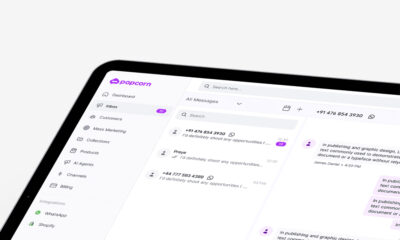Guides
The Most AI-Proof Career Opportunities In The Middle East
Concerned about AI’s impact on your career? Discover the most AI-proof job opportunities thriving in the Middle East and beyond.

The rise of artificial intelligence (AI) is sending shockwaves through the global workforce, transforming industries and displacing jobs at an unprecedented pace. Writers, graphic designers, web developers, transcriptionists, translators, and many others have seen their roles dramatically impacted in just the past two years (since the release of ChatGPT).
Given these rapid developments, it’s no surprise that people across the Middle East and other regions are increasingly looking for AI-proof their future. If you count yourself among them, you’ve come to the right place. In this article, we’ve thoroughly researched and compiled a list of career opportunities (presented in no particular order) that are likely to thrive in the Middle East despite the ongoing AI revolution.
Summary Of AI-Proof Career Opportunities:
| Career | Average Base Annual Salary (AED) |
| Artificial Intelligence Specialists | 171,000 |
| Maintenance Technicians | 48,000 |
| Doctors | 252,000 |
| Registered Nurses | 84,000 |
| Social Workers | 85,000 |
| Elementary And High School Teachers | 83,000 – 85,000 |
| Emergency Responders | 100,000 |
| Skilled Tradespeople | 60,000 |
Artificial Intelligence Specialists
💵 Average Base Annual Salary (Source): AED 171,000
It’s probably no surprise that one of the most career opportunities in the Middle East lies in the heart of the AI industry itself. The AI boom has naturally led to a surge in demand for professionals who have a deep understanding of the technology and can develop, implement, and troubleshoot AI systems.
In the United Arab Emirates, the number of AI workers quadrupled to 120,000 from 2021 to 2023, according to Al Olama, the UAE’s AI Minister, as the country pushes forward with its ambitious goal of becoming a global AI hub by 2031. The UAE is investing heavily in AI education and research, establishing dedicated AI universities and research centers to nurture local talent and attract international experts.
To become an AI specialist, you need to have a strong foundation in computer science, mathematics, and statistics. That’s why most AI specialists hold at least a bachelor’s degree in one of these fields, although many also pursue advanced degrees such as a master’s or Ph.D. to deepen their expertise and stay at the forefront of the rapidly evolving AI landscape.
Maintenance Technicians
💵 Average Base Annual Salary (Source): AED 48,000
The impact of AI extends far beyond the digital realm, as advanced robotics and intelligent machines are poised to revolutionize the physical world. Multiple companies, including Boston Dynamics, Tesla, and Figure AI, are working on developing general-purpose humanoid robots capable of performing a wide range of tasks guided by advanced AI reasoning.
As these sophisticated machines become more prevalent, they are expected to take over an increasing number of jobs in warehouses, factories, and hazardous environments. While this may lead to the displacement of some human workers, it also creates a growing demand for skilled maintenance technicians who can keep these complex systems running smoothly.
To succeed in this field, aspiring maintenance technicians should consider pursuing vocational training or a degree in mechatronics, robotics, or a related field. Hands-on experience through internships, apprenticeships, or industry collaborations can also be invaluable in developing the practical skills needed to excel in this role.
Doctors
💵 Average Base Annual Salary (Source): AED 252,000
In the Middle East, countries like Saudi Arabia, Qatar, and the UAE have shown a particularly strong willingness to embrace AI in healthcare, with two-thirds of their populations open to the idea of replacing doctors with robots, compared to just 55% across Europe, the Middle East, and Africa as a whole, according to a PwC study (PDF).
However, despite the rapid advancements in AI technology, doctors are unlikely to be made obsolete anytime soon. Instead, AI will become an invaluable tool that complements and enhances the expertise of medical professionals, enabling them to provide better care to their patients.
AI is already being used in various healthcare applications, from accelerating the development of new cures, enhancing disease detection, and improving patient outcomes. These developments have not gone unnoticed by UAE leaders, with the country’s National Artificial Intelligence Strategy 2031 placing significant emphasis on the healthcare field and the Ministry of Health and Prevention (MoHAP) launching the UAE health sector’s first Centre of Excellence (COE) for AI in October 2023.
Registered Nurses
💵 Average Base Annual Salary (Source): AED 84,000
Just like doctors, registered nurses are unlikely to be replaced by AI anytime soon, despite the development of robot nurses. The human touch, care, and empathy provided by nurses are invaluable, especially during times of sickness and vulnerability.
In fact, the demand for registered nurses in the Middle East is growing rapidly due to the region’s expanding population and the increasing healthcare needs of an aging demographic.
A recent report on the impact of AI on the Middle Eastern healthcare landscape predicts that the UAE will require an additional 15,000 nurses and allied health professionals in Abu Dhabi and 11,000 nurses in Dubai by 2030 to keep pace with the country’s healthcare needs. As a result, registered nurses can expect ample job opportunities in the Middle East, with AI serving as a tool to enhance their work rather than replace them.
Social Workers
💵 Average Base Annual Salary (Source): AED 85,000
The role of social workers is expected to remain essential and largely unaffected by automation. Social workers provide crucial support, guidance, and advocacy for individuals, families, and communities facing challenging circumstances, and the demand for their services is growing in the Middle East.
According to a recent statistic, the revenue of the human health and social work activities industry in the UAE is projected to reach approximately 5.9 billion U.S. dollars by 2024. This growth indicates a promising future for social workers in the region, as their skills and expertise will be increasingly sought after to address the diverse needs of the population.
For example, social workers have career opportunities in special needs centers, schools, geriatric and psychiatric hospitals, and other social service organizations. Depending on the specific role, such as social therapist, school counselor, or special needs teacher, obtaining a license may be required.
Elementary And High School Teachers
💵 Average Base Annual Salary (Source): AED 83,000 – 85,000
While AI is set to play a significant role in the education sector, it’s extremely unlikely to replace teachers entirely. Instead, AI will augment and support the work of educators.
According to the World Economic Forum, AI can assist teachers by automating administrative tasks, such as grading and record-keeping, allowing them to focus more on personalized interactions with students and enhancing the overall quality of education. Another exciting application of AI in education is the personalization of learning content and experiences. AI-powered systems can adapt to individual students’ needs, learning styles, and abilities, providing tailored support and resources to optimize their learning outcomes.
This creates new opportunities for tech-savvy teachers and those willing to embrace AI in their teaching methods. A teacher who understands modern AI tools and knows how to incorporate them effectively into their lesson plans will be highly sought after.
Emergency Responders
💵 Average Base Annual Salary (Source): AED 100,000
The jobs of emergency responders, including firefighters, paramedics, and police officers, are very safe from AI automation. The critical, hands-on nature of their work, which often requires split-second decision-making, empathy, and adaptability in unpredictable situations, guarantees that human responders will remain essential even in the future.
However, AI has the potential to revolutionize emergency response by assisting responders in various ways. Companies like Omdena are pioneering AI solutions to improve emergency response management, preparedness, and response.
For example, Omdena’s AI models analyze historical data, weather patterns, and other factors to predict the likelihood of emergencies such as floods, wildfires, and earthquakes. They also help optimize resource allocation and coordinate the response of different agencies to improve the efficiency and effectiveness of disaster relief operations.
Skilled Tradespeople
💵 Average Base Annual Salary (Source): AED 60,000
In the short term, skilled tradespeople can rest easy knowing that AI won’t be fixing leaky toilets, unclogging drains, or rewiring electrical panels anytime soon. The complex problem-solving skills and dexterity required for these tasks are still beyond the capabilities of current AI systems.
However, the medium and long-term outlook for trades in the Middle East is more complicated. As AI disrupts various industries, many people are considering transitioning to trades as a safer career option. This influx of new workers could potentially increase competition and put downward pressure on wages, especially for entry-level positions.
Moreover, in wealthier parts of the Middle East, the demand for skilled tradespeople is often met by workers from South Asia who are willing to accept lower wages. Despite these challenges, established tradespeople with a strong reputation and a loyal customer base can still thrive in the AI era by providing high-quality work and excellent customer service.
Conclusion
Even though the AI revolution is expected to disrupt the entire job market and make many traditional career paths obsolete, there are still plenty of work opportunities in the Middle East remain resilient against automation. Generally, the most AI-proof career opportunities are those that either directly contribute to the development and implementation of AI technologies or require uniquely human skills such as empathy, creativity, and critical thinking.
Guides
Top Free AI Chatbots Available In The Middle East
Discover the best free AI chatbots that are currently available to users in the Middle East so that you can experience the world-changing technology.
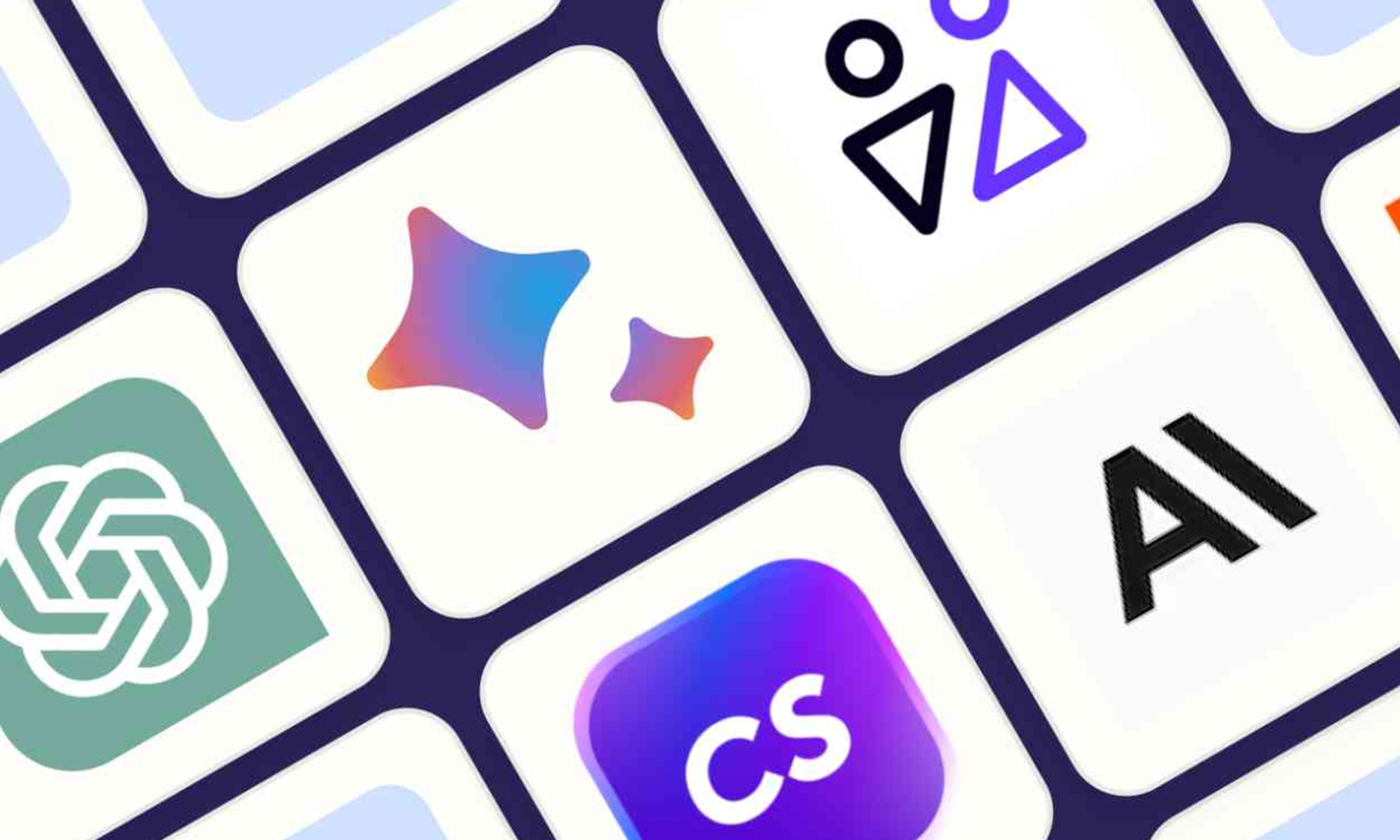
Large language models (LLMs) like ChatGPT are taking the world by storm, offering (mostly) accurate answers to a vast range of questions. While many of these cutting-edge AI models are developed by Western companies and trained predominantly on English data, their applications extend far beyond the English-speaking world.
We’ve done the research for you and compiled a list of the top free AI chatbots available in the Middle East. Whether you’re looking for a personal assistant to help you manage your daily tasks or a customer service chatbot to improve your business operations, we’ve got you covered.
#1- ChatGPT
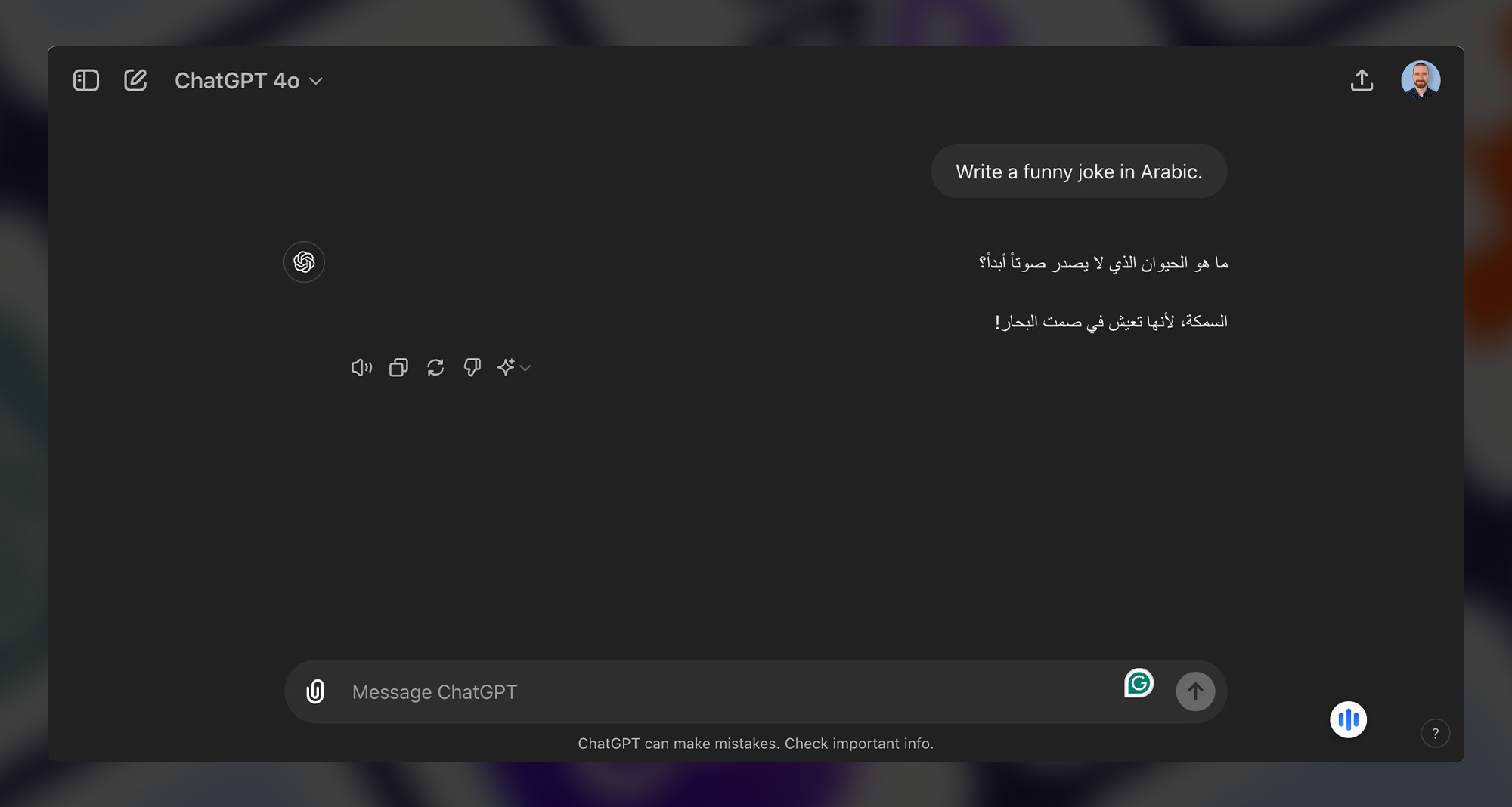
🌍 Availability: Bahrain, Egypt, Iran, Iraq, Israel, Jordan, Kuwait, Lebanon, Oman, Palestine, Qatar, Saudi Arabia, Syria, Turkey, United Arab Emirates, Yemen
🔣 Arabic Input: Yes
💬 Arabic Output: Yes
Developed by OpenAI, one of the most talked-about companies in the world today, ChatGPT has brought the transformative power of large language models to the masses since its release in November 2022. Even though it’s not OpenAI’s first chatbot, ChatGPT has captured the imagination of users worldwide with its ability to engage in natural language conversations and assist with a wide range of tasks.
Even in its free version, ChatGPT offers plenty of capabilities for users to enjoy, including full access to GPT-3.5 and limited access to GPT-4o, OpenAI’s latest and most advanced multilingual, multimodal model. At the time of writing this article, GPT-4o is the best-rated model in existence, so the fact that you can use it for free for a limited number of times within a three-hour window is pretty amazing.
Earlier this year, OpenAI introduced voice chat capabilities to free users, meaning if you’ve ever wanted to interact with an AI using voice commands, now you can do so without any cost. Voice interactions with ChatGPT offer a more intuitive and natural way of communication, bridging the gap between human and machine interaction, and then come in handy when driving, cooking, and doing other activities that make it inconvenient or impossible to type.
Pros:
- The best-rated AI chatbot today
- Can provide accurate and helpful responses to a wide range of questions
- Free access to a robust set of features
- It’s easy to use, with a simple and intuitive interface
Cons:
- Usage limits
#2- Mistral AI
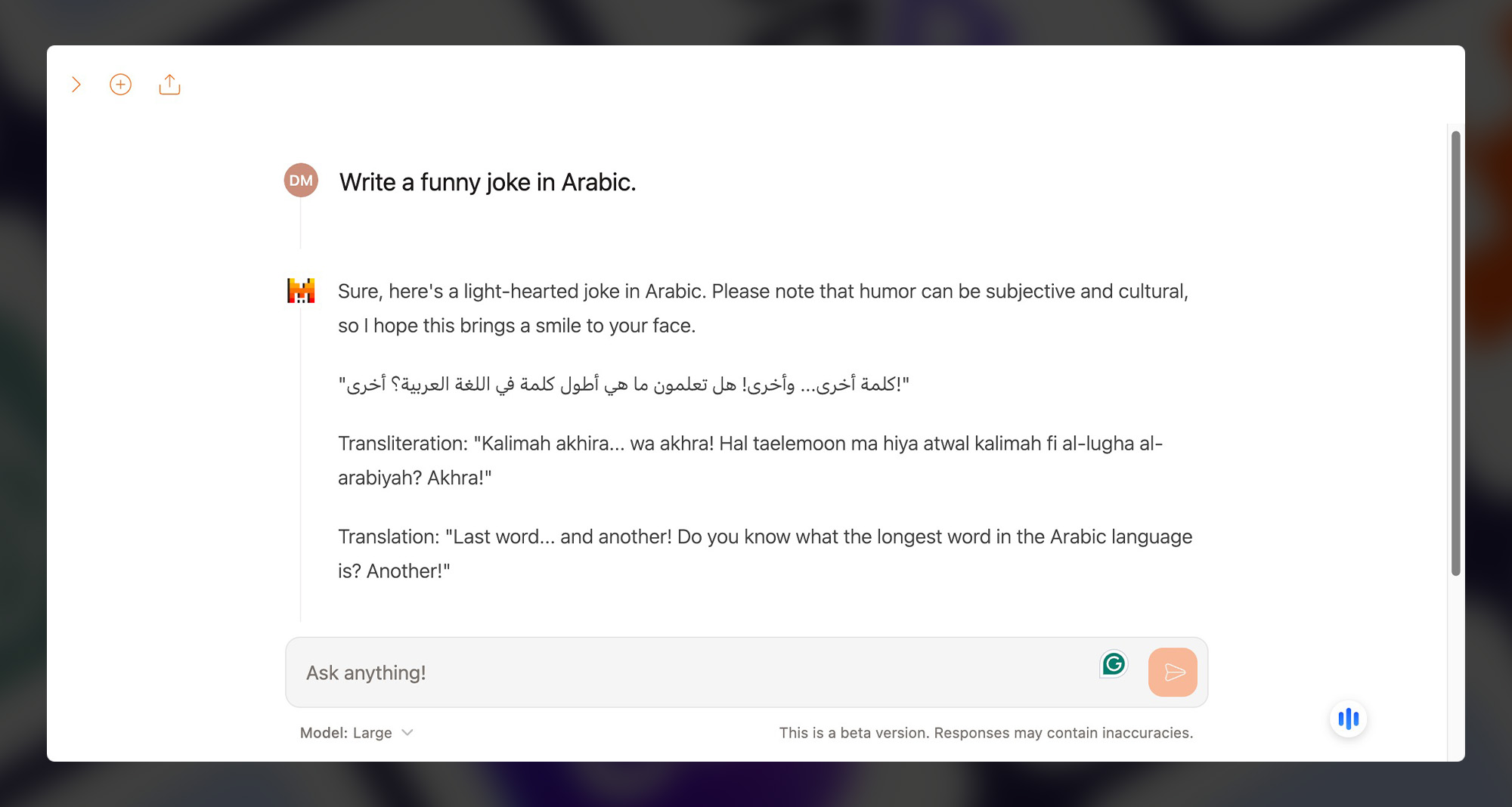
🌍 Availability: Everywhere
🔣 Arabic Input: Yes
💬 Arabic Output: Yes
Founded in April 2023 by a team of former employees from Meta Platforms and Google DeepMind, Mistral AI has quickly positioned itself as a significant player in the realm of artificial intelligence. As a French company dedicated to democratizing AI technology, Mistral AI focuses on developing open-source large language models accessible through its web-based chat interface.
The models vary in scale and specialization — from heavy-duty processing with the Large model, known for its top reasoning capacities, to the Small model, designed for fast and cost-effective interactions. They also offer Codestral, tailored specifically for coding purposes, and Next, a prototype model trained for conciseness and efficiency.
Mistral AI currently doesn’t offer any paid tier, which means that free users have access to everything the company offers. Usage limits do exist, but they are dynamically adjusted based on demand, so you may not even hit them.
Pros:
- Access to a range of large language models
- No paid tier, so free users have access to everything
- It’s easy to use, with a simple and intuitive interface
Cons:
- Usage limits
- Relatively new player in the AI market
#3- Google Gemini
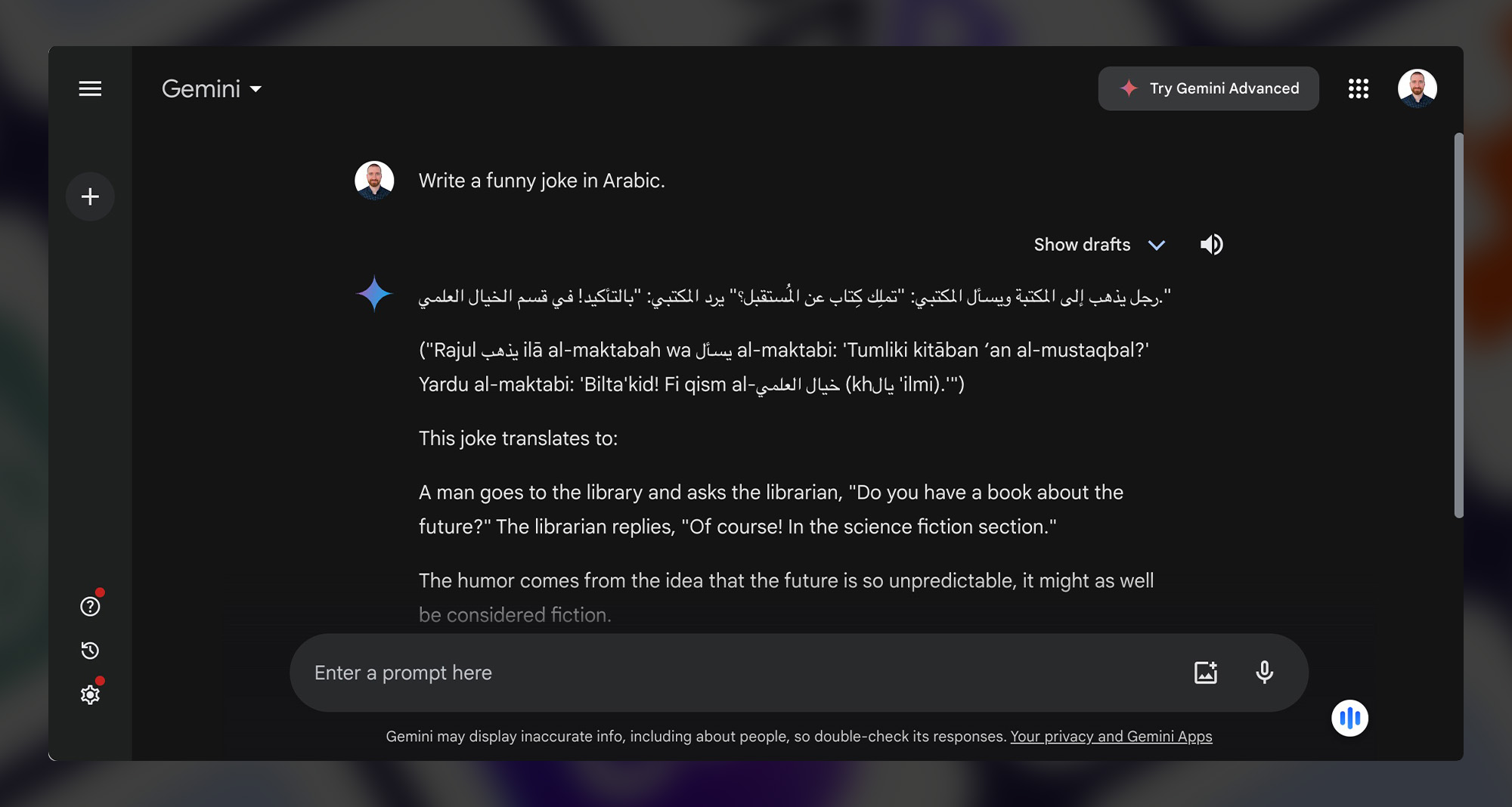
🌍 Availability: Bahrain, Egypt, Iraq, Israel, Jordan, Kuwait, Lebanon, Oman, Qatar, Saudi Arabia, Syria, Turkey, United Arab Emirates, Yemen
🔣 Arabic Input: Yes
💬 Arabic Output: Yes
Previously known as Bard, Google Gemini is a powerful large language model developed by Google AI. With the free version of Google Gemini, users have access to the 1.0 Pro model, which integrates seamlessly with Google apps that you already know and use, such as Gmail, Calendar, and Docs. This makes it an excellent choice for those who rely heavily on Google products for their daily tasks.
However, compared with GPT-4o and Mistral’s Large model, the free version of Gemini is much worse at following instructions closely. On the other hand, Gemini offers a significant advantage in terms of speed. Additionally, Google doesn’t seem to be actively enforcing usage limits on the free tier, so you can use it as much as you want without worrying about hitting a usage cap.
Pros:
- Integrates with Google apps
- Fast and no real usage limits
- It’s easy to use, with a simple and intuitive interface
Cons:
- Doesn’t follow detailed instructions well
#4- Claude
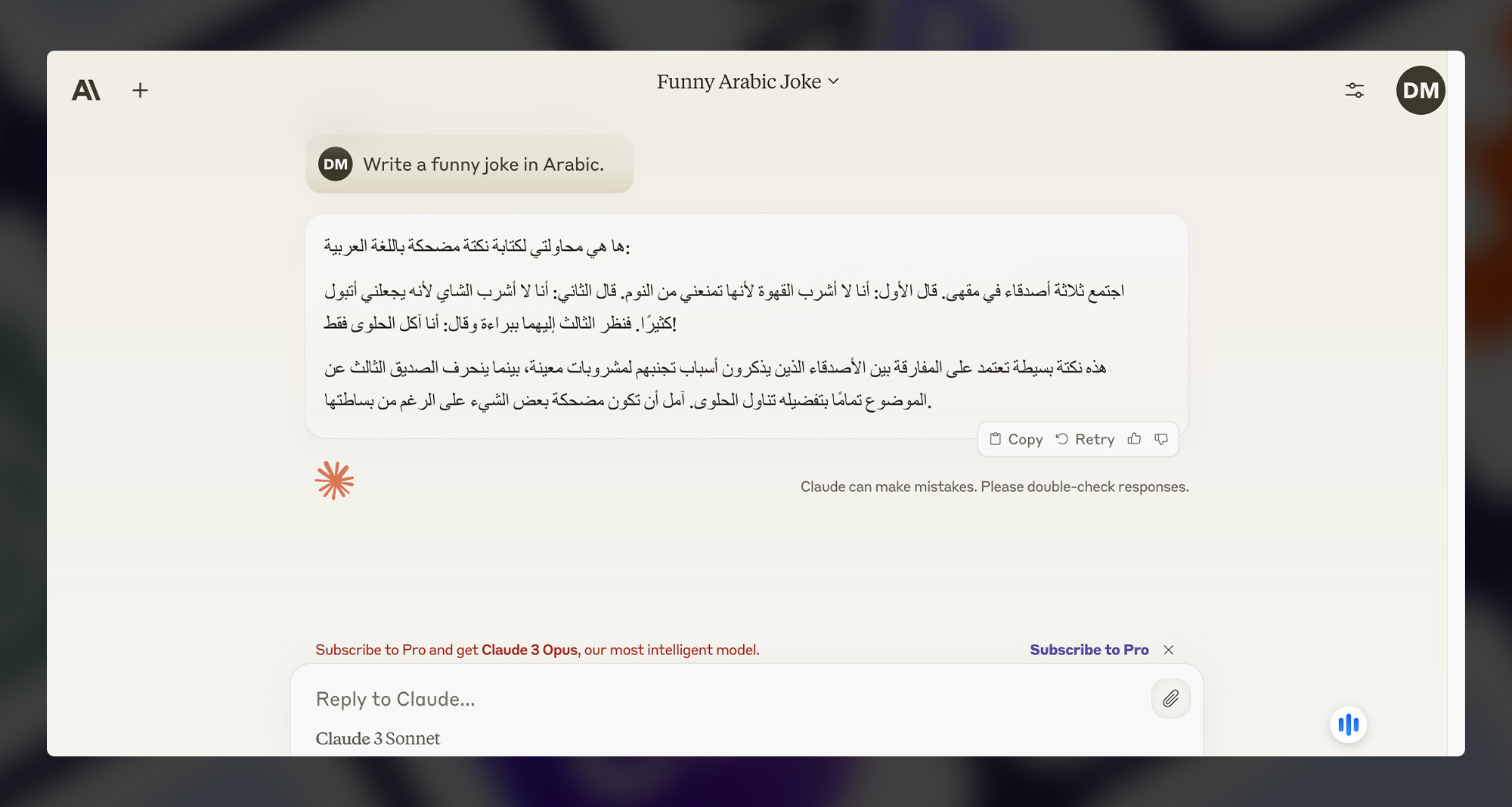
🌍 Availability: Bahrain, Cyprus, Egypt, Iraq, Israel, Jordan, Kuwait, Lebanon, Oman, Palestine, Qatar, Saudi Arabia, Turkey, United Arab Emirates, Yemen
🔣 Arabic Input: Yes
💬 Arabic Output: Yes
Claude is a family of AI models developed by Anthropic PBC, a US-based artificial intelligence (AI) startup company founded in 2021. The company’s mission is to research and develop AI technology that benefits the public. Anthropic was founded by former members of OpenAI, Daniela Amodei and Dario Amodei, and has since made a name for itself in the AI community.
Free Claude users can access the Sonnet model, which is designed for natural language processing tasks such as text generation, translation, and summarization. Sonnet comes with a daily messaging limit that’s dynamically adjusted based on demand and reset every morning. Unfortunately, the limit can be quite unpredictable in practice, allowing you to chat extensively one day and then stopping you after a few messages the next one.
Pros:
- Free access to the Sonnet model
- Daily message limit is dynamically adjusted based on demand
- It’s easy to use, with a simple and intuitive interface
Cons:
- Unpredictable daily limit
#5- Local LLMs
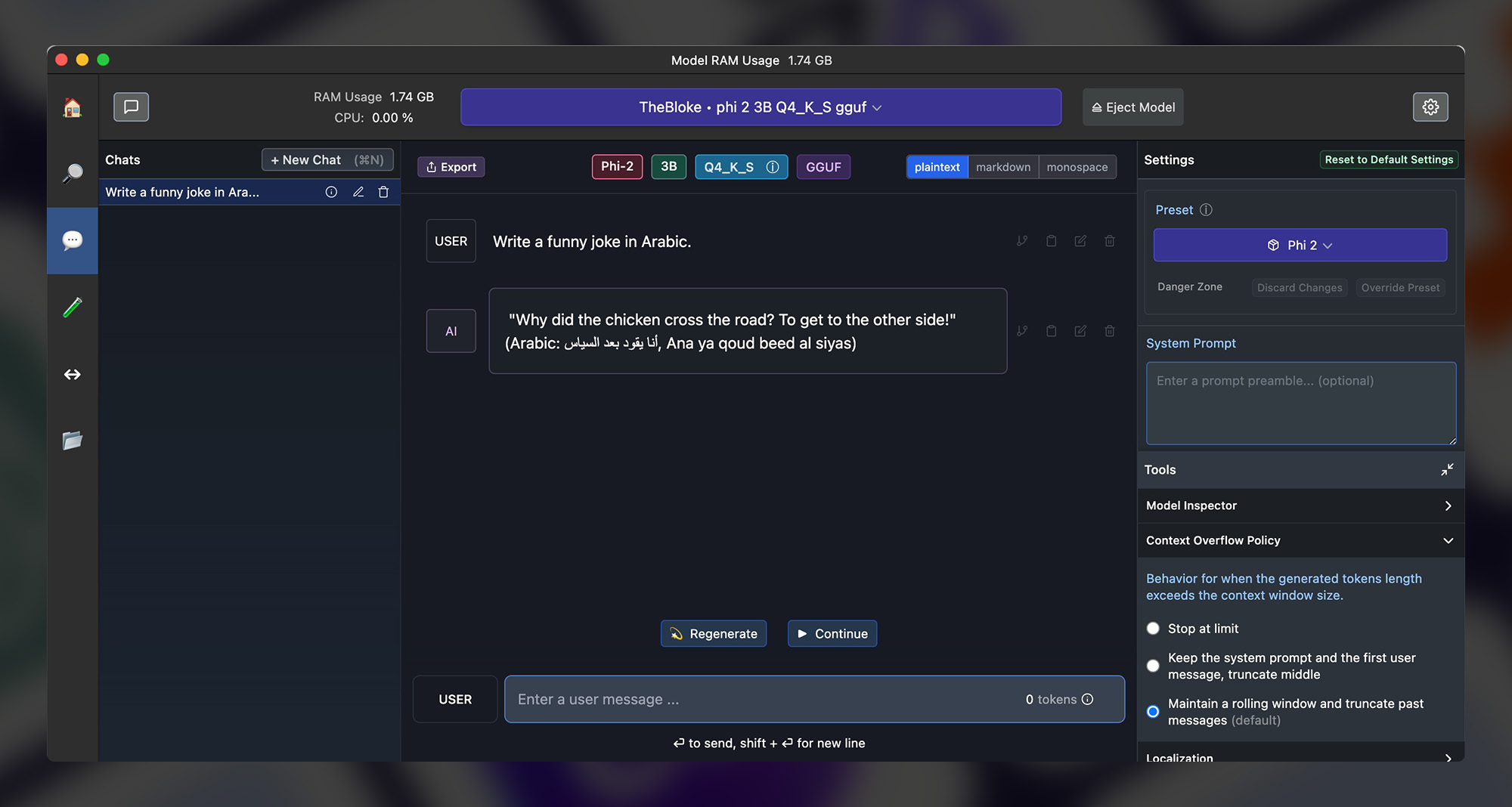
🌍 Availability: Everywhere
🔣 Arabic Input: Depends on which model you choose
💬 Arabic Output: Depends on which model you choose
Local LLMs are a breed apart from the cloud-based solutions we’ve discussed so far. Instead of relying on powerful remote servers, these models run entirely on your own computer hardware. Examples include Llama 3, Phi 3, and Gemma.
One of the biggest advantages of local LLMs is that they are uncensored. Another advantage of local LLMs is that they can be customized to your specific needs. For example, you can fine-tune the model on your own data, allowing it to better understand and generate responses that are specific to your industry or use case.
However, there are also some downsides to using local LLMs. The biggest challenge is that they can be more difficult to set up and maintain than cloud-based AI chatbots. You’ll need to have the right hardware and software, such as Ollama or LM Studio, to run the model, and the performance of your hardware directly influences the performance you can expect.
Pros:
- Complete control and customization
- Uncensored and unrestricted by content limitations
- Arabic-specific models available
Cons:
- More difficult to set up
- Performance depends on how powerful hardware you have
- Can’t match leading cloud-based models
Conclusion
The Middle East region has access to some of the best free AI chatbots available in the market. From ChatGPT’s natural language processing capabilities and Mistral AI’s range of large language models to Google Gemini’s integration with Google apps and Claude’s focus on ethical AI, each chatbot has its own unique strengths and weaknesses. Local LLMs also offer a viable alternative for those who prefer to have complete control and customization over their AI models. Ultimately, the best AI chatbot for you will depend on your specific needs and preferences.


